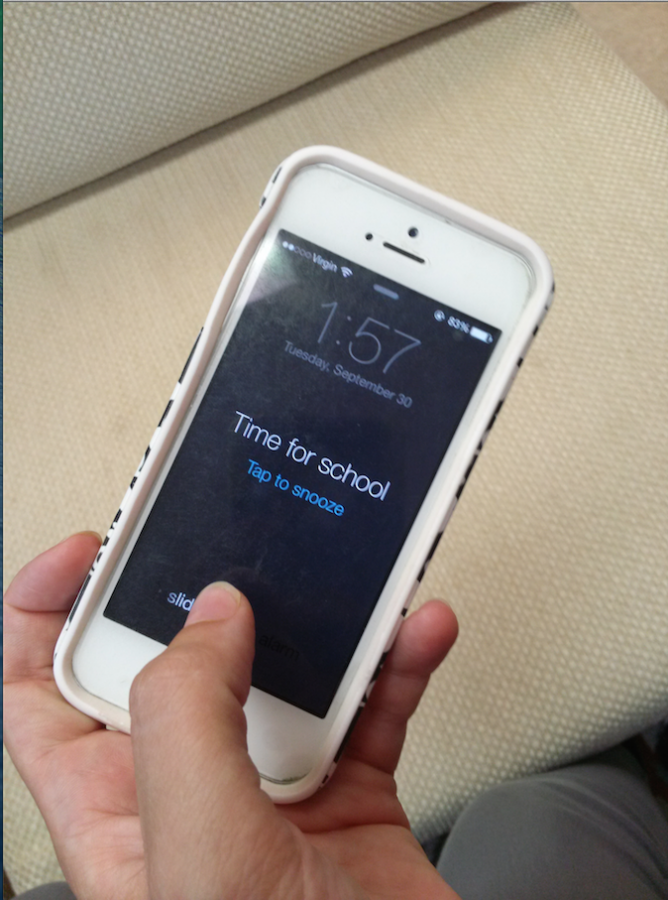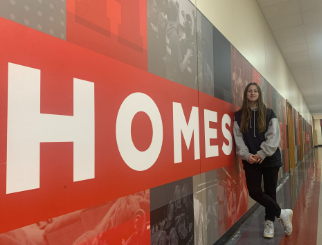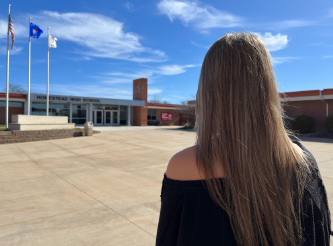Early bird wants some sleep
Homestead student automatically presses snooze button to doze more prior to attending school.
Lethargic, dormant, oblivious – all adjectives that can describe the student body at 7:20 a.m. No amount of overpriced Starbucks caffeine-in-a-cup can cure the inevitable trance that is doomed to occur when each and every student walks through those electronically powered doors.
Every student has proudly declared the following two phrases at least once in their high school career: “I’m tired,” and “I don’t want to be here.” They are usually accompanied with some muffled noise of agony. But why? Why do we submit ourselves to the torturous act of waking up at the crack of dawn to subject to the orders of adults stuffing knowledge into our unresponsive, unwilling, still-foggy heads?
According to a recent study released on Aug. 25, 2014 by the American Academy of Pediatrics (AAP), middle and high schools should delay the start of class to 8:30 a.m. or later. The reason for this need is the shift in sleep cycles that occurs within teenagers. Explaining this further, Taylor & Francis, a world-renowned research organization, stipulated that the reason for this shift in sleep patterns is due to the sleep-wake cycle that teenagers develop, which is regulated by a part of the brain called the Suprachiasmatic Nucleus (SNC). When one reaches puberty, this portion of the brain shifts internal body clocks to push optimal sleep later into the evening, which makes it remarkably difficult for most teens to fall asleep before 11 p.m. Combined with the earlier school start times, the effects of this are profound and far-reaching.
Dr. Judith Owens, MD, a Fellow of AAP, said in the AAP policy release statement, “The research is clear that adolescents who get enough sleep have a reduced risk of being overweight or suffering from depression, are less likely to be involved in automobile accidents, and have better grades, higher standardized test scores and an overall better quality of life.”
Pointing at a possible solution, Dr. Owens claims, “Studies have shown that delaying early school start times is one key factor that can help adolescents get the sleep they need to grow and learn.” This seems to be a feasible solution, especially when one considers that a National Sleep Foundation poll discovered that 59 percent of middle school students and 87 percent of high school students in America were getting less than the recommended eight-and-a-half to nine-and-a-half hours of sleep on school nights. Only contributing to the epidemic of adolescent sleep deprivation, approximately 40 percent of American high schools, including Homestead, have a start time before 8 a.m. Only 15 percent start at 8:30 a.m. or later. So, with this myriad of evidence supporting later school start times, one may wonder just why Homestead High School starts at the early time of 7:25 a.m., especially when many students account their struggles with early school start times.
Moreover, a majority of Homestead students find it difficult to concentrate in class when they are fatigued. McKenna Stern, senior, who participates in Spanish Club, Girls Exploring Math and Science (G.E.M.S.), Link Crew and the National Honors Society, claims that although she is used to the early school start time, she still finds it difficult. Also, she adds that going immediately to an AP class, or any class in general, is hard on her brain.
Mirroring her experience, Eliza Imbrie, freshman, who engages in the Robotics Club and Best Buddies, claims that she finds it difficult to focus, especially during her earlier classes.
Obviously, sleep deprivation is contributing to a negative impact on some students overall academic experience. There is a recognizable correlation between tiredness and performance, and any signs of fatigue could lower quality of work in various insidious fashions.
Mr. Brett Bowers, principal, believes that, “it’s not more when we start, but it’s when you (the students) go to bed.”
Mrs. Jill Cook, English teacher, has taught at multiple different high schools with various start times, and after 24 years of teaching she sees “more and more students getting less and less sleep, regardless of the start time at school.” She expresses her that concern is “sleep deprivation and it’s effects for all of us and on all of us.” In addition to sleep deprivation making it difficult to concentrate in class, many find it difficult to carefully balance all their academic and extracurricular responsibilities if they are exhausted after school ends.
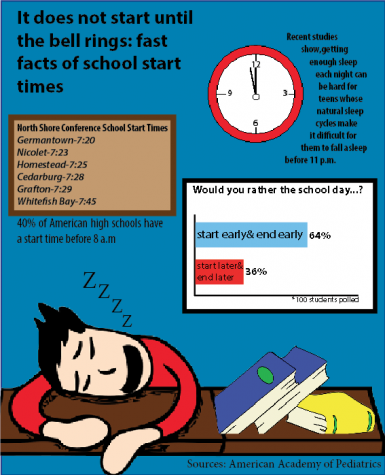
Alondra Delgado, sophomore, who volunteers at a local hospital, a member of the Costume Department, and works at the Weyenberg Library, details her weekly schedule. “School starts at 7:25 a.m. and then ends at 2:37 p.m., but then on Mondays I volunteer until 6 p.m. and then I have a job that lasts from three to four hours each week. Also, there are extracurricular activities I participate in such as Costumes that runs from Monday through Thursday. By the time I get home at 10 p.m., I still have two to four hours of homework to complete.” So, after a strenuous day of school and extracurricular activities, Delgado then has to complete her homework during the late hours, guaranteeing that she will not get a decent amount of rest. And this is not an isolated experience, either.
Lexi Kenwood, senior, agrees with how it is very difficult it is for her to juggle three AP classes, cross country, Color Guard, and her job at McDonald’s. With this level of dedicated commitment, many students find themselves sapped of energy, a problem that is only exacerbated by their lack of sleep, which is largely caused by early school start times.
However, despite the evidence leaning towards shifting school start-up times to later hours, there is still reluctance to do so. Arguments against pushing back school start times relate to extracurricular activities, such as sports, since some believe that pushing school start times back will limit the amount of time students can dedicate to those activities. It remains a contested issue, with varying opinions.
While innumerable students moan at the early start times, many would also oppose starting school at a later time, such as 8:30 a.m. Stern argues that schools should not push back their start times because school would end later, ultimately extending extracurriculars after a time people are used to. Providing a contrasting opinion, Claire Pfeifer, junior, active in the swim team and the ski team, said that schools should be pushed back to a later time, even though it would be harder for those who engage in extracurricular activities, since then most practices would not end until 6:30 p.m or later. “It would be a good idea to at least experiment with implementing these later school start times,” Pfeifer stated.
The Mequon-Thiensville School District relies upon busing, which is a strong factor in why high school starts so early. There is a “three-pronged cycle that creates the need for our start time, so that then eventually the busses can get the middle schools for the middle school students, and then eventually get the elementary students, so it’s really the tiered busing that really drive the times of our day,” Mr. Bowers explained.
Although delaying the start of school seems to have a myriad of potential health boons, there are several logistical obstacles that would prevent this from occurring at Homestead currently.

Katie Starsky, a cheerful perfectionist, owns her own Pinterest book where she gets all her ideas to create what the student body calls their yearbook....

Beth Emery is a junior who can’t wait for summer. It may be beginning of the school year, but the only thing on her mind is Summer 2015. The last place...
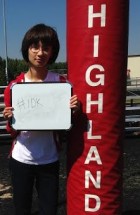
Madina Jenks is a senior and a new copy editor for Highlander Publications. As a copy editor, her jobs are pretty simple: write and help others write....
Sydney Roeper, who rides the struggle bus frequently, is a girl unlike any other. On any given day, Sydney can be found either at the ice rink, practicing...

